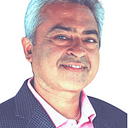New Ways of Removing Waste: OD Experiments at Stanford University Medical Center — X
[Continued from “Advocating for Human-Oriented Sustainability Standards: OD Journey at Stanford University Medical Center — IX”…]
Consistent with the notion that all organization, regardless of where we think the boundaries of organization end, is subject to a fractal foundation, unexpected doors opened and I continued to find myself in new fields expressing ideas about the Fractal Organization…
…With the Lean Movement growing in force especially in US Healthcare, the invitation to present at the East Bay Section of the American Society of Quality was therefore timely and welcome.
My key-points, as much valid today, were:
- We are going through a fundamental change in the business environment. Small, local actions, whether by business or banks, that for centuries could be ignored, can no longer be ignored. The micro and the macro are now intimately connected. This is evident in macro-phenomenon such as Climate Change and the Financial Crises that have been created by numerous micro-actions, and therefore indicate the changed nature of our business playing-field (re: Redesigning the Stock Market: A Fractal Approach).
- Old paradigms are being challenged and even failing as a result of not accurately seeing the intimate connection between the micro and the macro. A new language to connect the micro and the macro is essential. Fractal modeling provides just such a bases for a new language (re: Connecting Inner Power with Global Change: The Fractal Ladder).
- Further, organizational fractal modeling brings to light a dynamic pattern of progress that repeats itself on different scales, the constituents of which are the physical, vital, ad mental orientations of being. Much of the practical world is structured by these orientations and any sustainable quality or lean approach has to ground itself in an intimate understanding of these orientations.
- Through fractal modeling it becomes apparent that additional levers by which quality is achieved are emerging. For it is evident that the global economy is transitioning from the vital to the mental phase of this fractal macro-pattern. Quality has “grown up” in the vital milieu. Its very bases has to be enhanced by the fact that a new paradigm of envisioning quality representative of the essence of the mental phase, has to come into being.
- The fundamental focus remains that of removing waste from the system. Only, the limits and the nature of the system are redefined, to in effect also allow for the removal of waste along the inner psychological dimensions at the individual and team levels, to better orient organizations for the long-term.
- In this reconsideration an important micro-lever that emerges is that of managing individual states of being, such as stress, at the personal level. A resultant macro-lever is that of sustainability or corporate social responsibility (CSR), which can be thought of as an index of dysfunction that does not need to be.
- In other words, fractal-based thinking suggests that lack of management of states such as stress at the individual level, ripples out to create major dysfunction at subsequent levels of complexity, leading all the way up to the global macro-level. Externalities are minimized when thinking and decision-making emanate from the mental as opposed to the vital level.
- This gives rise to implications for management of quality, and even the central place that quality might hold in creating a more sustainable world.
[To be continued…]
